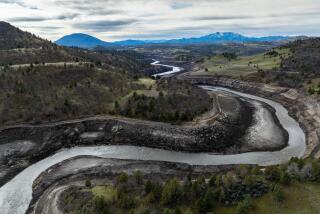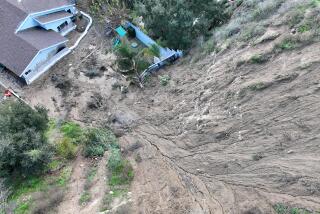Family Engineered Island of Resistance Against River
- Share via
GRAND FORKS, N.D. — On Hughes Court, where the Red River of the North snakes past some of this city’s loveliest waterfront abodes, the Kvistads made their stand.
Not only were they trying to save their self-built dream home from one of America’s worst urban floods, but they were also trying to protect a precious Dakotan commodity: more than 7,000 pounds of sugar beet seed, which they had hauled from their garage into their living room.
“It was like war,” Bob Kvistad, a 41-year-old grain broker whose wife, Marietta, sells seed to local farmers, said Friday. “Usually, the river wins. But not always.”
And not this time.
As others reluctantly abandoned ship last weekend, heeding the evacuation orders of National Guard troops, the Kvistads soon found themselves alone, the last line of defense between the Red River and this corner of a watery ghost town. Frantically, around the clock, they labored to keep their prized island afloat.
Like a modern-day Swiss Family Robinson, they cooked thawing meat from their freezer on an outdoor grill. At night, they worked by the light of flaming patio torches. For baths, they slipped into a next-door friend’s hot tub. When it came time to hunt down extra tools or supplies, their 18-year-old son Peter ventured off in a canoe.
All the while, they vacuumed and bailed, sucking out the polluted brown water that seeped and surged over the dike of sandbags and plywood and plastic tarps ringing their 3,500-square-foot home.
*
With equipment bequeathed by fleeing neighbors, they managed to deploy an army of 13 pumps, fueled by two gas-powered generators, flushing out an estimated 600,000 gallons of water a day that otherwise would have rushed over their patio, into the basement and close to the living room floor.
“It’s amazing how ingenious you can be when you have to,” said Marietta Kvistad, 45, whose weeklong siege kept her house dry--along with $250,000 worth of premium Vanderhave 66 Series sugar-beet seed.
“There are farmers whose livelihood depends on planting this stuff,” she added.
Although much of Grand Forks remains under evacuation and accessible only by boat, the water here in the southern end of town slowly has begun to recede, tempting refugees from the Kvistads’ neighborhood to slip past security checkpoints for a first-hand look at their homes. Despite official concerns about looting and disease, police have offered little resistance to anyone with identification and a desire to assess the loss.
Some have even stopped by the Kvistad place to pay their respects.
“You are rare in this town,” said Dieter Heitmann, 60, the owner of All Seasons Garden Center. “I want to congratulate you. I’ve never seen such engineering.”
It is a bittersweet victory for Bob and Marietta, still living alone amid the devastation of Hughes Court. The way they look at it, they merely applied the common-sense lessons of their childhoods, “the sort of things you learn growing up on a farm . . . just being around rivers and land and understanding the power of the water,” as Bob put it.
He also knows that his house stands dry today largely because his neighbors gave up. “As they left, one by one, they all came over and said, ‘Good luck, take whatever you need,’ ” he recalled, rubbing a weathered hand across his unshaven face. “I’m happy in a very tiny way for myself, but I also feel guilty in a way for being the only one.”
To show their gratitude, the Kvistads have assumed responsibility for at least seven neighboring homes, cleaning out spoiled refrigerators, shutting off gas valves and feeding stranded pets. Every day, they have taken their video camera outside, documenting the flood’s ebb and flow. Every day, their exiled neighbors have called from out of town, wanting the latest report.
“It’s hard to tell them,” Marietta said. “They’re going to have a tough time coming back.”
When they built their home here a decade ago, the Kvistads (pronounced KWIS-tad) knew that the Red River’s record high was 49 feet, a good 5 feet below their newly laid foundation. The flood stage is 28 feet, a football field away from their back porch.
As a result, they didn’t worry much when last winter’s historic snowpack began to melt, spilling the Red River over its banks. They helped build dikes for neighbors at lower elevations, figuring the water would never crest at 54 feet, as it did, right at their basement windows.
“It’s a great place to live,” Marietta said, “except for every 500 years.”
*
Certainly, other residents of Grand Forks suffered far worse fates, their homes entirely submerged. But few people stayed behind to battle the Red River mano a mano, let alone with the conviction and imagination of the Kvistads.
During the evacuation, they sent their two youngest children, 16-year-old Heidi and 11-year-old Tyler, to stay with their grandparents in western North Dakota. Then they lugged the sugar beet seed--more than 300 boxes, each weighing 25 pounds--from the garage up into the living room.
Fearing that they would run out of gas or blow a fuse, they monitored their borrowed equipment 24 hours a day, shuffling the circuits and reconfiguring the maze of extension cords, anything to ensure the makeshift system didn’t coming crashing down.
“Every day, we reevaluated everything, creating back-ups and then back-ups to the back-ups,” said Bob, who kept a meticulous log--still nailed to a patio wall--that notes water levels, gas consumption and every change of oil in their generators.
They maintained an informal ban on alcohol, not that they had time to drink. They took shifts sleeping. To get to a portable toilet--left behind from the community’s sandbagging brigade the week before--they had to walk along the top of a dike, waist-high water on either side. In case of an emergency, they tied a long rope around a big black inner-tube.
Vigilant about infection, they continually washed their hands in chlorinated water and ate their food from within plastic sandwich bags.
“It was just so wild and crazy,” Bob said. “If one little thing had gone wrong, we would have been out of here.”
Eventually, as they went from a crisis mode to a maintenance pattern, there was time for a few small indulgences. With the pumps no longer shooting water like a fire hose, they found enough electricity to power the children’s cherished aquarium, which stayed high and dry throughout the ordeal despite its basement showcase. Peter, who earned the nickname “McGyver” for his daring sorties, paddled out to dry land to pick up several of his uncles, who proceeded to do a little fishing from the Kvistads’ porch.
On Friday, with dry ground popping up around the house, they could even laugh about it.
“It was like a camping trip,” Bob said. “Almost.”
More to Read
Sign up for Essential California
The most important California stories and recommendations in your inbox every morning.
You may occasionally receive promotional content from the Los Angeles Times.













